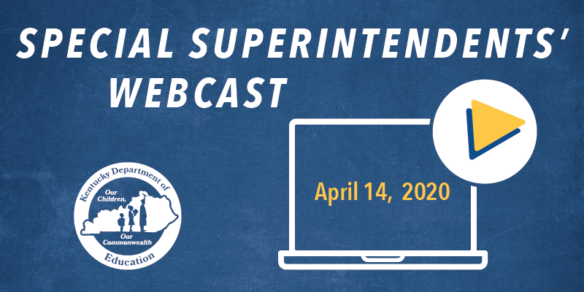
- Rob Akers, associate commissioner of KDE’s Office of Educator Licensure and Effectiveness, told the superintendents that it was important to get the information to them as districts enter the period in which educators are hired and promoted.
- Interim Education Commissioner Kevin C. Brown confirmed that Kentucky will receive $193.2 million specifically for K-12 education from the federal Coronavirus Aid, Relief and Economic Security Act.
By Mike Marsee
mike.marsee@education.ky.gov
A series of waivers will remove barriers to educator preparation, certification and evaluation created by the COVID-19 emergency.
The Kentucky Department of Education (KDE) briefed superintendents of Kentucky’s 172 school districts during a KDE webcast April 14 about the waivers approved by the Education Professional Standards Board (EPSB) at its meeting a day earlier.
Rob Akers, associate commissioner of KDE’s Office of Educator Licensure and Effectiveness, told the superintendents that it was important to get the information to them as districts enter the period in which educators are hired and promoted.
“We’ve got several updates that should help you as you begin navigating through the hiring season,” Akers said.
Several waivers focused on educator preparation, easing requirements for admission assessments and student teachers for the 2019-2020 school year:
- Prospective educators will not be required to take and pass a Praxis test – either the Core Academic Skills for Educators tests or a Graduate Record Examinations test – for conditional admittance to an educator preparation program if they have met all other admission requirements. Most of those tests have been postponed by the provider, the Educational Testing Service (ETS), although some at-home testing options are becoming available.
- Some of the required 70 days of student-teaching have been waived.
- A waiver will allow university supervisors of student teachers to conduct observations remotely, and the requirement of four observations also has been waived.
EPSB eased a certification requirement that cannot be met because ETS testing centers are closed, approving a one-year certificate for those who are missing certain required assessments but will have met all other requirements for certification by the time that certificate expires.
Akers also noted that districts were given flexibility to make changes to their certified evaluation processes, procedures and timelines that affect all certified personnel for the 2019-2020 school year by Senate Bill 177.
Local boards of education will have the sole authority to make those changes, which do not require approval by KDE.
The deadline of May 15 for written notices regarding salaries or nonrenewal of contracts remains in place, and those notices may be provided via mail or email.
Impact Kentucky Survey Release
Akers updated superintendents on the status of the Impact Kentucky working conditions survey administered to educators earlier this year. The release of those results originally was scheduled for March but was pushed back indefinitely.
He said plans are under way to release the data in time for districts to use it in areas such as planning professional development for the 2020-2021 school year.
“We really do want this to be a meaningful data set to help you inform your decision-making,” Akers said.
CARES Act Funding
Interim Education Commissioner Kevin C. Brown told superintendents that the U.S. Department of Education (USED) confirmed April 14 that Kentucky will receive $193,186,874 specifically for K-12 education from the federal Coronavirus Aid, Relief and Economic Security (CARES) Act.
That money will represent Kentucky’s share of the Elementary and Secondary School Emergency Relief Fund, at least 90% of which will be distributed to districts.
Brown said USED will issue guidance to KDE “within days,” and money from the fund will be disbursed directly to districts to use for eligible expenditures.
K-12 schools also will be eligible for some of an estimated $43.8 million from the Governors’ Emergency Education Relief Fund.
“We want to make sure that we spend all the money that we get from the federal government to help districts and kids,” Brown said.
Brown also told the superintendents they should expect another conference call with Gov. Andy Beshear early next week. Beshear has held four conference calls with the district leaders since March 11 concerning school closures. He recommended that schools suspend in-person classes beginning March 16 for a period that has been extended twice to May 1.
MORE INFO …
- April 14 Special Superintendents’ Webcast
- Kentucky Department for Public Health’s COVID-19 webpage
- KDE’s COVID-19 webpage
- COVID-19 Hotline (800) 722-5725




Leave A Comment